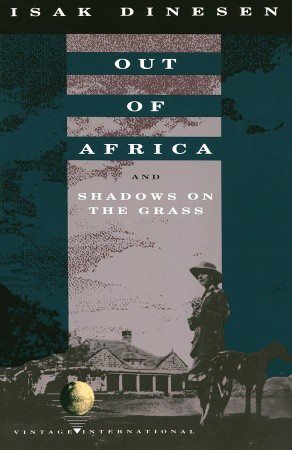
“Perhaps he knew, as I did not, that the Earth was made round so that we would not see too far down the road.”
― Isak Dinesen, Out of Africa

“Perhaps he knew, as I did not, that the Earth was made round so that we would not see too far down the road.”
― Isak Dinesen, Out of Africa
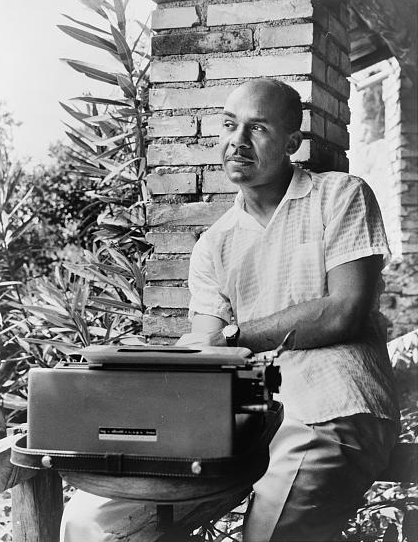
“Life is to be lived, not controlled; and humanity is won by continuing to play in face of certain defeat.”
― Ralph Ellison, Invisible Man
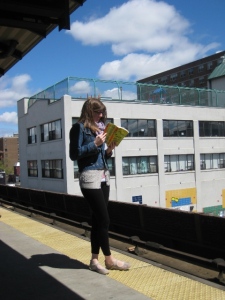 Unknown, reading The Girl with the Dragon Tattoo
Unknown, reading The Girl with the Dragon Tattoo
1. Why did you choose this book?
I did a bookswap with a friend I worked with, and my brother had recommended this one.
2. What did you trade for it?
Her Fearful Symmetry (by Audrey Niffenegger).
3. What are your favorite books?
The Time Traveler’s Wife (also by Audrey Niffenegger), The Great Gatsby (F. Scott Fitzgerald), and Jodie Picoult’s My Sister’s Keeper.
4. Do you judge books by their covers?
I try not to, I go off a recommendation, and sometimes I scan a bookstore.
5. What did you have for breakfast?
A pear, yogurt and cereal.
WORD on the street, Tuesday 4/27 (NYC: on the N between Broadway and Astoria/Ditmars)
Alan Sillitoe died on April 25, 2010 at Charing Cross Hospital in London. Two days later, we met Kayley reading The Loneliness of the Long-Distance Runner
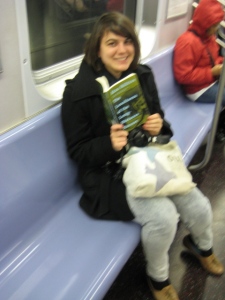 1. Why did you choose this book?
1. Why did you choose this book?
A friend and I had unearthed a battered copy at a used bookstore about 2 years ago, and were drawn to it not knowing much about Sillitoe’s work specifically, but more of the adapted film from the 1960s (with Tom Courtenay and Michael Redgrave. The title is also referenced by several bands, such as Belle & Sebastian on their Push Barman to Open Old Wounds album.) I’ve always been intrigued by this voice of post-WW II blue-collar England, and Sillitoe was a major contributor in both books and film dealing with that subject matter, written during that time. I had been meaning to borrow it from my friend since then, but saw this Vintage edition while shopping a few weeks ago. And here we are.
2. Do you like it?
I’ve just begun to focus on this book – I’ve only read the first two stories, but I’m really enjoying his style so far. For all of their outward irredeemable qualities, Sillitoe’s protagonists are these incredibly affected individuals searching for identity and purpose in a society that has already determined what their roles should be. He has this completely honest narrative that can be tongue-in-cheek one minute and absolutely devastating the next. I’m really looking forward to the rest of it.
3. What are your favorite books?
Something around Kundera’s The Unbearable Lightness of Being, Dostoevsky’s The Brothers Karamazov, Graham Greene’s The End of the Affair, Joyce’s A Portrait of the Artist as a Young Man, Evelyn Waugh’s Brideshead Revisited, Carson McCullers’ The Heart is a Lonely Hunter, John Updike’s Rabbit novels.
4. Do you judge books by their covers?
I try not to, but I think that a clever cover can have a real impact on why you purchase a book, especially if you aren’t familiar with the author and are initially drawn to the jacket design. If it’s done just right, I think cover art can even influence the way you perceive the story, or present a focus that you may not initially have considered. I love the cover art of this edition, by the way.
5. What did you have for breakfast?
This book. With a coffee.
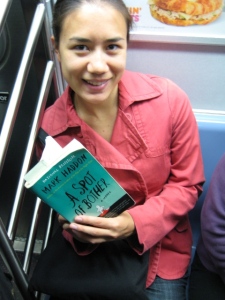 Joanna, reading A Spot of Bother
Joanna, reading A Spot of Bother
1. Why did you choose this book?
I really liked Mark Haddon’s other book, The Curious Incident of the Dog in the Night-Time. Then a friend recommended this one to me when we were discussing books with gay characters.
2. Do you like it?
I like it. In the first 40 pages or so, I wasn’t sure that it was going to catch my interest, but then it picked up and I suddenly felt invested in the story. It sometimes makes me cringe, kind of like a TV drama, when the characters aren’t understanding each other and conflicts are piling up. But the relationships are more realistic than in a TV drama, so that’s a relief!
3. What are your favorite books?
Life of Pi (Yann Martel), Interpreter of Maladies (Jhumpa Lahiri), Zeitoun (Dave Eggers), Native Speaker (Chang-rae Lee), The Bell Jar (Sylvia Plath)….
4. Do you judge books by their covers?
Not usually, because I find out about them online, and can only see a little thumbnail image of the cover anyway.
5. What did you have for breakfast?
Cereal—three types mixed together. I still haven’t found one cereal that I like on its own.
WORD on the street, Monday 4/12 (NYC: on the W between Broadway and 39th Ave.)
Randy, reading The Age of Wonder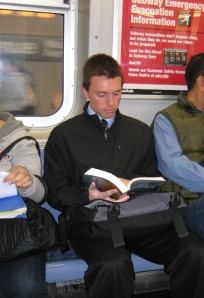
1. Why did you choose this book?
I read a review somewhere, maybe Salon.
2. Do you like it?
Very much.
3. What are your favorite books?
Do you want types of books or titles? That would take a long time.
Either is great.
Mostly straight literature. But lately I’ve been getting into nonfiction, like this one, historical science. But Russian lit was always my biggest thing.
Ok now a title.
Since I read it when I was 16, and I read it again all the time, Crime and Punishment (Fyodor Dostoevsky).
4. Do you judge books by their covers?
I try not to but I definitely do, even it’s subconsciously. Especially if I know nothing about it, then the cover can make a big difference.
5. What did you have for breakfast?
Pop-tarts. Why, are you finding a correlation between breakfast and reading habits?
Not really. What kind of pop-tarts?
Brown sugar cinnamon. Pop-tarts and coffee.
Mavis, reading Never Let Me Go
1. Why did you choose this book? 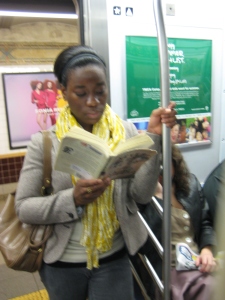
I chose it because I’ve heard a lot about the author, and wanted to read something he’d written. I also wanted to read a book with a setting outside of the US, and thought the UK would be a good place to start.
2. Do you like it?
I do like it. It started off a little bit slow (first 30 pages), and I wasn’t sure if I wanted to continue reading, but I gave it a chance and now I’m really into it. It’s definitely an interesting book with some very thought-provoking concepts. I also really like the sci-fi aspect of it, which is surprising because I generally don’t like sci-fi novels.
3. What are your favorite books?
My favorite books are Little Women by Louisa May Alcott, The Book of Night Women by Marlon James, Jesus Land by Julia Scheeres, In the Name of Salome by Julia Alvarez and The Local News by Miriam Gershow.
4. Do you judge books by their covers?
Generally, I don’t. I look at the title first, and then read the blurb.
5. What did you have for breakfast?
Today I had a slice of whole wheat toast and some juice. I’m not really that hungry in the mornings.
WORD on the street, Tuesday 3/23 (NYC : on the N between 39th Ave. and Queensboro Plaza)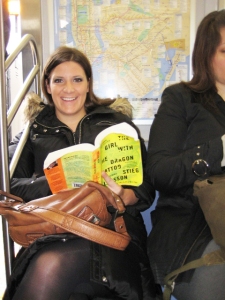
Heather, also reading The Girl with the Dragon Tattoo
1. Why did you chose this book?
My roommate gave it to me.
2. Do you like it?
Yes.
3. What are your favorite books?
Currently The Help by Kathryn Stockett.
4. Do you judge books by their covers?
Yes.
5. What did you have for breakfast?
I haven’t had breakfast.
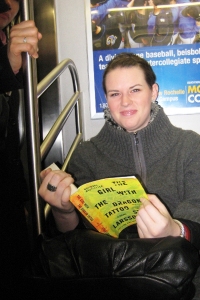 The Sun and Anchor introduces WORD ON THE STREET. Here Roving Vintage Bloggers ask smart, funny (and friendly) readers what they’ve chosen and why.
The Sun and Anchor introduces WORD ON THE STREET. Here Roving Vintage Bloggers ask smart, funny (and friendly) readers what they’ve chosen and why.
We can’t be everywhere, so if you’re reading a V/A title you love, send us a photo and let us know!
Julianne, reading The Girl with the Dragon Tattoo
1. Why did you choose this book?
The cover seemed interesting.
2. Do you like it?
Yes, (but she is only on page 6).
3. What are your favorite books?
Tom Wolfe’s The Electric Kool-Aid Acid Test, and A Confederacy of Dunces (by John Kennedy Toole).
4. Do you judge books by their covers?
Yes. (see no.1)
5. What did you have for breakfast?
Nothing yet.
WORD on the street, Saturday 3/13 (Greyhound station at White River Junction, VT)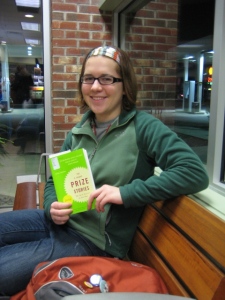
Anna, reading The O. Henry Prize Stories 2008
1.Why did you choose this book?
I was looking for something random to distract me from classes. It’s from the Dartmouth College library.
2. Do you like it?
Yes.
3. What are your favorite books?
I’ve read mostly books on neuroscience.
4. Do you judge books by their covers?
A cover should be intriguing.
5. What did you have for breakfast?
A bagel with cream cheese.
The highly acclaimed, National Book Award Finalist and nationally bestselling IMPERIAL LIFE IN THE EMERALD CITY, by Rajiv Chandrasekaran, is getting an exciting second life in the upcoming major motion picture, GREEN ZONE. Starring Matt Damon, it opens wide March 12, 2010, and offers the fullest, most intimate account of life in the Green Zone: the sheltered bubble where idealistic Americans planned the occupation while Iraq fell apart.
The Green Zone, Baghdad, 2003: in this walled-off compound of swimming pools and luxurious amenities, Paul Bremer and his Coalition Provisional Authority set out to fashion a new, democratic Iraq. Staffed by idealistic aides chosen primarily for their political affiliations and views on issues such as abortion, the CPA spent the crucial first year of occupation pursuing goals that had little to do with the immediate crises of a postwar nation. In this acclaimed firsthand account, the former Baghdad bureau chief of The Washington Post gives us an intimate and remarkably dispassionate portrait of life inside this Oz-like place, which continued unaffected by the growing mayhem outside. This is a quietly devastating portrait of imperial folly, and an essential book for anyone who wants to understand those early days when things went irrevocably wrong in Iraq.
CHECK OUT THE ALL-NEW FOREWORD from Paul Greengrass, director of GREEN ZONE, included in the new special movie tie-in edition of IMPERIAL LIFE IN THE EMERALD CITY, after the jump. Continue reading
The Sun & Anchor asks writers and editors about what goes on behind the scenes. Next up — Award winning writer (and Veteran Vintage Publicist) Ethan Rutherford on Bad Advice
Write what you know, write what you know. I’m not sure who first came up with that little nugget of wisdom, but it’s everywhere. It’s in the air. It gets passed around like a cold in writing workshops and “how to” books. And, if taken the wrong way, it’s just a terrible, destructive piece of advice, almost as misleading as “show don’t tell”.
Why? Because if taken the wrong way—which is what you do as a young writer, you take everything the wrong way (I still take things the wrong way, I can’t help it)—it’s the sort of set-in-solid-stone advice that will shut down your imagination before it even wakes up. This is fiction we’re talking about, the realm of boundless dramatic opportunity. Your characters can do anything you want them to do, anywhere you want them to do it. Your imagination is a muscle; so flex that mofo. Don’t give your emotional experience to a character just like you—you know, we know, where that leads: to someone, sitting at a desk, writing about what it was like to become a writer. That’s fine for non-fiction. But for fiction? A reader—or, I should say, this reader—wants to be flung far and transported; I want to immerse myself in the fully imagined lives of characters I’ve never—would never—encounter, in situations I would never find myself in. I want to be surprised at the recognition something shared between myself and these characters, linking us. And further away you are from that character’s experience, the more surprising that recognition is when it comes, and the harder it hits.
So if the goal of a story is to make the strange familiar, why not begin with the strange? Why not write what you don’t know, but are interested in exploring? John Gardener has written that a successful ending ought to be both surprising and inevitable. The problem with writing what you know is that, from the outset, you know how you are going to demystify the experience, and while you often stick an ending that’s inevitable, rarely is it surprising (to you, to the reader, to everyone). Set the stakes a little higher. Wade into a pool that you think might be just a little too deep. Let that story gallop ahead of you, so when you do, finally, lasso it, and bring it home to the Recognizable Corral, you’re not sure exactly how you’ve done it, and are just as amazed as everyone else.
ABOUT: Ethan Rutherford’s fiction has appeared in Esopus, New York Tyrant, VERB, Faultline, American Short Fiction, Fiction on a Stick, and the Best American Short Stories 2009. His stories have received Special Mention in the 2009 and 2010 Pushcart Prize anthologies, and he is the recent recipient of a SASE/Jerome Foundation Grant for Emerging Writers, as well as a Minnesota State Arts Board Grant. In 2009, he received his MFA in creative writing from the University of Minnesota. He’s just finished a collection of short stories, and is at work on a novel. Click here to read some of his work.
In their respective novels SUM: Forty Tales from the Afterlives and 36 Arguments for the Existence of God: A Work of Fiction, David Eagleman and Rebecca Goldstein both explore the relationship among science, literature and religion. In a candid and uncensored email conversation, the authors compare their writing processes and talk about their search to marry the limitations of science with literary imagination.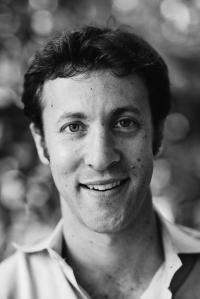
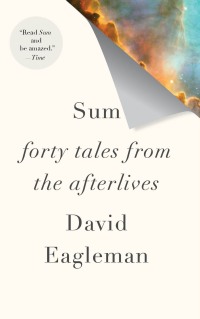
Dear Rebecca,
First, let me say that I loved 36 Arguments for the Existence of God. It’s wide ranging and very smart in its approach to life’s questions. While reading your book, it struck me that you and I are both writing from a similar space at the intersection of science and literature. We both live in the corridors of academia–and even more specifically, in the world of the science of the mind–and our fiction seems to soak up that background in the form of vocabulary and concepts.
There’s probably a lot to explore about that nexus of worlds, but to get the conversation started I thought I’d pick out one particular point: I think that space provides a good launching pad for exploring big ideas while giving no truck to dogmatism. And that seems to be the formula for both good science and good literature.
As we know, many first-class writers spend their energies assembling arguments in the God/No God debate, but perhaps there is more interesting material to talk about. To this end, I immediately liked the deception of your book’s title: I felt that the real story was neither about arguments for nor against the existence of God, but instead about interesting ideas in the middle ground. The narrative seeks no easy solutions, but is instead willing to live with complexity. This is epitomized in one of your characters, Azarya, who understands both the speciousness of religious edicts as well as their deep importance to community.
In the end, your book struck me as both post-religious and post-atheist. Am I correct about that characterization, or would you disagree? This is actually a description that a reader suggested to me about Sum during a book reading. I loved the phrase and stole it! After all, life is more interestingly complicated than either side of the God argument might suggest, and it often feels to me that a science-based and non-dogmatic position might be the right place to start the exploration. After all, the scientific temperament is persuaded by evidence, but when no evidence exists, it is comfortable with uncertainty. I think that’s an interesting place from which to write literature nowadays. What are your thoughts?
-David
Dear David,
It is wonderful to be in dialogue with you. Although we’ve never met, I know that there is much mutual understanding and sympathy. We’re both as deeply touched by science as by literature, and, for some reason that I’ll never understand, that makes us members of a smallish set. I have some specific questions I’d love to ask you, but before I get to them let me address your questions to me.
You’re right that I tried, from the very beginning of the book–that is, in its title–to squeeze in the ambiguity and complexity and paradox that I think lurks around these God debates. The full title is even longer than the one you quote. It’s “36 Arguments for the Existence of God: a Work of Fiction,” and I meant that sub-title to be an ironic comment on the proofs themselves (or, as one ardent atheist reader pointed out, on God Himself, a work of fiction). I wanted ambiguity and complexity and paradox because that’s the sphere that humans inhabit at their deepest core, and no questions draw deeper from that core than those raised by the God debates. In the Appendix, where I simply analyze the arguments as a trained philosopher, I can be straightforwardly rigorous, knocking down one argument for God’s existence after another. But in the body of the novel, where the human reactions toward the whole complicated business of religion is what animates the plot and characters, things gets far more complicated. Is it possible to be an atheist who feels sympathy toward at least some of the religious impulses–which, by the way, I think can be given purely secular expression? Would that make me post-atheist and post-religious? I’m not sure, but in any case, that describes me.
So here’s my question to you regarding your extraordinary Sum: Do you have a philosophical position regarding the possibility of the afterlife, and did it in any way play into the conception of your novel? Do your professional views in neuroscience allow you to entertain the possibility of an afterlife?
My best,
Rebecca
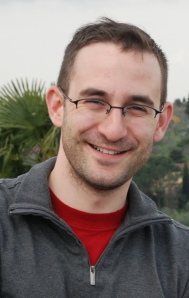 Introducing a new, semi-regular series in which we interview writers and editors about what goes on behind the scenes.
Introducing a new, semi-regular series in which we interview writers and editors about what goes on behind the scenes.
First up, Vintage Editor Zack Wagman.
How long have you been an editor? What made you want to become an editor?
I’ve been an editor for 6 years now, though some of that was as an assistant. Actually, I originally wanted to work in the film business (I’m a huge movie nerd), in “development,” though I don’t think I really understood what that meant. All I knew was that I was an avid reader and preferred working behind the scenes. The summer I graduated from college, I was working as a freelancer for a professor of mine who was publishing a book with Random House. As I got to know more about the editorial process and the publishing world, I realized that in publishing, I’d be able to work in pop culture and help develop projects that I believed in. Eventually, I got hired at Knopf and I’ve been here ever since.
What are the most important qualities in an editor as you see it?
Patience is a virtue! You’ll need patience to read through the countless bad manuscripts to find that hidden gem; to problem-solve with an author to get the manuscript to where it needs to be; and to be an enthusiastic cheerleader for the book at the company. I would also say an open mind, courage to take a risk, and a sense of fun.
What was the best advice you got at the beginning of your career?
My first boss in publishing, Vicky Wilson, told me to always trust my instincts. I would have put that in my answer above, but I didn’t want to steal her line. But it’s true! I’ve read manuscripts that aren’t necessarily a natural fit for the Knopf Group, but I made a stink about anyway because either I couldn’t stop turning pages or it stuck with me well after I finished reading.
What’s the biggest cringe-worthy moment you’ve had in your career so far?
A few years ago, after corresponding with an LA-based author for months, I finally met her in person. She made a strange comment when she first saw me: “Huh. I always pictured you as a blonde.” I was sort of caught off-guard and tried to recover with a joke: “Oh, because of Zack Morris?” She just stared at me in total confusion for what felt like five full minutes and then walked away. It was a meaningless moment and didn’t affect our working relationship at all, but it was damn awkward.
What advice would you give the Future Publishers of America?
Read what’s on the New York Times bestseller lists! I’ve interviewed job applicants before—many of them right out of college. And here’s a piece of advice: as much as we all love and respect Tolstoy, Dickens, and James Joyce, citing them as what you’ve read recently doesn’t do much for me. I’d much rather hear your opinions on Dan Brown, Stieg Larsson, or Malcolm Gladwell.
Who are your greatest influences?
Pixar, comic books, my parents, Michael Chabon, Billy Wilder. Not necessarily in that order.
Complete this sentence: if it weren’t for _____ I never would have gotten my foot in the door.
If it weren’t for persistence, I never would have gotten my foot in the door. I sent my resume to Random House for about 6 months before anyone called me back!
How much do you read?
I typically read about 2-3 books a week. Sometimes more, sometimes less. I’m always reading on the train—usually work stuff in the morning and something lighter in the evening. I read at my desk when I can, but I’m usually dealing with emails, factsheets, catalog and cover copy, reader reports, etc. so it’s not that often. I read a lot of newsy/politics/pop culture blogs in the morning and at night. And I try and read for pleasure so I can remember why I got into this business in the first place!
What surprised you most about the getting published process?
How hard it is! Even if you know tons of people in the industry and have written a great book, there’s no guarantee. It’s so subjective that you really need to get the book into the hands of the right reader, otherwise you’ll be told “It’s not right for me.” That’s why I always tell aspiring writers to get an agent! They know the landscape and will get the book into the right hands.
What is paperback editorial like? How does it differ from hard cover editorial?
The cool thing about paperbacks is that we have a precedent to work from. At Vintage, when we prepare to publish a paperback, we look at how the hardcover did. Sometimes it was such a success that we just keep the cover, plaster the back with tons of great quotes, and publish as is. But a lot of times, something didn’t quite click in hardcover – timing, package, etc. and we need to rethink it. And that’s the fun part. We get a new cover, find some positive quotes, get a new afterword if appropriate, put it out in the summer instead of the fall, and try something new. It doesn’t always work, but the new energy and creativity is invigorating.